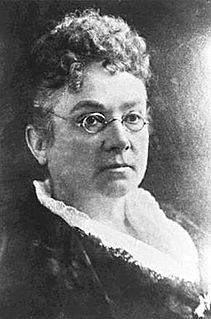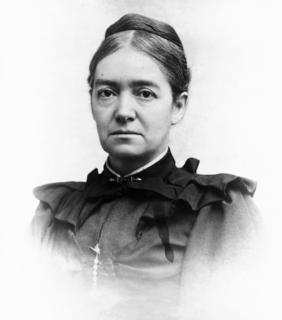Related Research Articles

Emily Howarde Stowe was the first female physician to practise in Canada, the second licensed female physician in Canada and an activist for women's rights and suffrage. Stowe helped found the women's suffrage movement in Canada and campaigned for the country's first medical college for women.
Bachelor of Medicine, Bachelor of Surgery, or in Latin: Medicinae Baccalaureus Baccalaureus Chirurgiae, are the two first professional degrees in medicine and surgery awarded upon graduation from medical school by universities in countries that follow the tradition of the United Kingdom. The historical degree nomenclature states that they are two separate undergraduate degrees; however, in practice, they are usually combined as one and conferred together, and may also be awarded at graduate-level medical schools. In countries that follow the system in the United States, the equivalent medical degree is awarded as Doctor of Medicine (MD) or Doctor of Osteopathic Medicine (DO).

Marie Elisabeth Zakrzewska was a Polish physician who made her name as a pioneering female doctor in the United States. As a Berlin native, she found great interest in medicine after assisting her mother, who worked as a midwife. Best known for the establishment of the New England Hospital for Women and Children, she opened doors to many women who were interested in the medical field and provided them with hands-on learning opportunities. Within The New England Hospital, she established the first general training school for nurses in America. Her drive and perseverance made the idea of women in medicine less daunting.
A licentiate is a degree below that of a PhD given by universities in some countries. In others, for example almost all countries in the European Union, a licentiate is a 3 to 4 years degree, equivalent to a bachelor's degree. The term is also used for a person who holds this degree. The term derives from Latin licentia, "freedom", which is applied in the phrases licentia docendi meaning permission to teach and licentia ad practicandum signifying someone who holds a certificate of competence to practise a profession. Many countries have degrees with this title, but they may represent different educational levels.

Mary Corinna Putnam Jacobi was an esteemed American medical physician, teacher, scientist, writer, and suffragist. She was the first woman to study medicine at the University of Paris, and had a long career practicing medicine, teaching, writing, and advocating for women's rights, especially in medical education. Disparaging anecdotal evidence and traditional approaches, she demanded rigorous scientific research on every question of the day. Her scientific rebuttal of the popular idea that menstruation made women unsuited to education was influential in the fight for women's educational opportunities.

Dr. Arnold Snow Naudain was an American physician and politician from Odessa in New Castle County, Delaware. He was a veteran of the War of 1812, and a member of the Whig Party, who served in the Delaware General Assembly and as U.S. Senator from Delaware.
The London School of Medicine for Women established in 1874 was the first medical school in Britain to train women as doctors.

Dorothy Celeste Boulding Ferebee was an American obstetrician and civil rights activist.

Christopher Christian Cox was known as an American surgeon, professor at Philadelphia College of Medicine and served briefly as a politician.
Historically and presently, in many parts of the world, women's participation in the profession of medicine has been significantly discouraged. On the other hand, women's informal practice of medicine in roles such as caregivers, or as allied health professionals, has been widespread.

Ann Preston was an American physician, activist, and educator.
Cornelius Ambrose Logan was an American physician, writer, and diplomat, best known for his two terms as United States Ambassador to Chile during difficult times.
Julia Holmes Smith was an American physician, publisher, and suffragette from Georgia. Born to a wealthy family, she received private tutoring then attended a women's school in New York City. Widowed at an early age, Smith remarried in 1872 and attended medical classes at the Boston University School of Medicine and Chicago Homeopathic Medical College. She opened a medical practice in Chicago, Illinois and was the first dean of the National Medical College. In 1895, she was appointed the first female trustee of the University of Illinois
Angella Dorothea Ferguson is an American pediatrician known for her groundbreaking research on sickle cell disease.
Mary Amanda Dixon Jones was an American physician and surgeon in the field of obstetrics and gynecology, who the first American physician to propose and perform a total hysterectomy to treat a tumor in the uterine muscle (myoma). Jones had a successful career until her work doing gynecological surgery at Woman's Hospital of Brooklyn drew the attention of the news media, and she was the subject of a 24-article investigative expose by the Brooklyn Eagle. As a result, she was charged with one count of murder, and one count of manslaughter. She was found not guilty, and sued the Eagle. She lost the libel case, and was forced to close her medical practice. Jones then spent the last years of her medical career doing research on the tissue pathology of gynecological conditions.

Mary Almera Parsons was an American physician who successfully petitioned for the Medical Society of the District of Columbia to grant medical licenses to women.
Medical Society of the District of Columbia is an American medical society that supports physicians in Washington, D.C.

Carrie Chase Davis was an American physician and suffragist. After teaching for some years, she graduated with a Medical Degree from Howard University College of Medicine in 1897, with a specialization in Bacteriology. She was one of the leading women practitioners of the Western Reserve and was also prominent as a woman suffragist of the west. Davis served as secretary of the Erie County Medical Society, and recording secretary of the Ohio Woman Suffrage Association.
Eunice P. Shadd was a Canadian-American physician. She was one of the first black women to graduate from Howard University College of Medicine.
References
- ↑ "A Short History, Howard University College of Medicine". medicine.howard.edu.
- ↑ Moldow, Gloria (1987). Women doctors in gilded-age Washington : race, gender, and professionalization. University of Illinois Press. pp. 105–115. ISBN 9780252013799.
| This biographical article related to medicine in the United States is a stub. You can help Wikipedia by expanding it. |